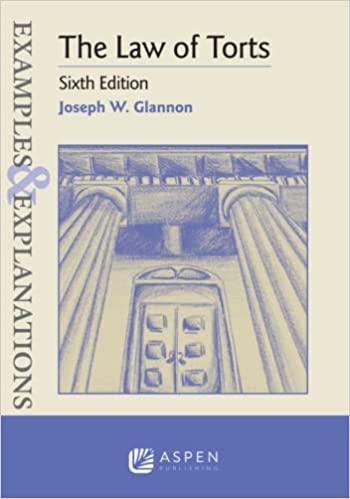Question
William Redmond, Jr., worked for PepsiCo in its Pepsi-Cola North America division (PCNA) from 1984 to 1994. Redmond became the General Manager of the Northern
William Redmond, Jr., worked for PepsiCo in its Pepsi-Cola North America division ("PCNA") from 1984 to 1994. Redmond became the General Manager of the Northern California Business Unit in June, 1993, and was promoted one year later to General Manager of the business unit covering all of California, a unit having annual revenues of more than 500 million dollars and representing twenty percent of PCNA's profit for all of the United States.
Redmond's relatively high-level position at PCNA gave him access to inside information and trade secrets. Redmond, like other PepsiCo management employees, had signed a confidentiality agreement with PepsiCo. That agreement stated in relevant part that he
w[ould] not disclose at any time, to anyone other than officers or employees of [PepsiCo], or make use of, confidential information relating to the business of [PepsiCo] ... obtained while in the employ of [PepsiCo], which shall not be generally known or available to the public or recognized as standard practices.
Question 21
In the chapter on diabetes you wrote that you should avoid tablets
before age of 40 years in non-insulin-dependent diabetes mellitus
(NIDDM). Why is this, because in our country most doctors are
prescribing this?
Question 22
1. Should a patient poorly controlled on glibenclamide 15 mg a day and
metformin 1500 mg a day be moved onto insulin?
2. What are the indications for insulin in type 2 diabetics?
Question 23
What happens to the insulin-secreting capacity of a type 2 diabetic
placed on insulin therapy earlier than recommended? Can the external
supply of insulin improve the functional capacity of the insulin-secreting
cells, to some extent by providing some rest to these cells?
Question 24
1. Is inhaled insulin a suitable substitute for injectable insulin?
2. Is there, or will there soon be, insulin in the form of a tablet?
Question 25
What are the complications of insulin other than hypoglycaemia and
injection?
Question 26
I would like to know the processes that go into administering the
Alberti's/modified Alberti's regime in patients with uncontrolled
diabetes mellitus.
Question 27
Is there any role for steroids in the management of resistant diabetes
mellitus (daily insulin requirement exceeding 100 units/day)? Don't they
make glycaemic control worse?
Question 28
What is the importance of potassium chloride (KCl) in the treatment of a
diabetic patient (pre-operative care)? The formula in the text is explained
as 16 U of insulin10 mmol of KCl500 mL 10% glucose.
Question 29
What is the cut-off point of daily albumin excretion above which a
diabetic patient without hypertension should be given an angiotensinconverting enzyme (ACE) inhibitor?
Question 30
What is the urinary concentration or 24-hour urine albumin content above
which angiotensin-converting enzyme (ACE) inhibitors should be started
in diabetic patients? Does an albumin (in microgram)/creatinine (in
milligrams) ratio above 30 in the morning sample indicate a need for thiscopy19
Step by Step Solution
There are 3 Steps involved in it
Step: 1

Get Instant Access to Expert-Tailored Solutions
See step-by-step solutions with expert insights and AI powered tools for academic success
Step: 2

Step: 3

Ace Your Homework with AI
Get the answers you need in no time with our AI-driven, step-by-step assistance
Get Started


